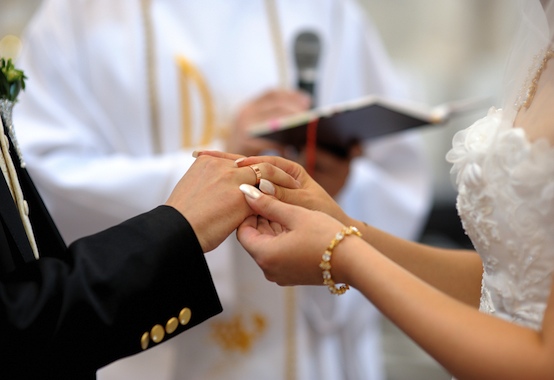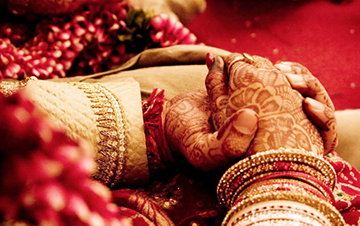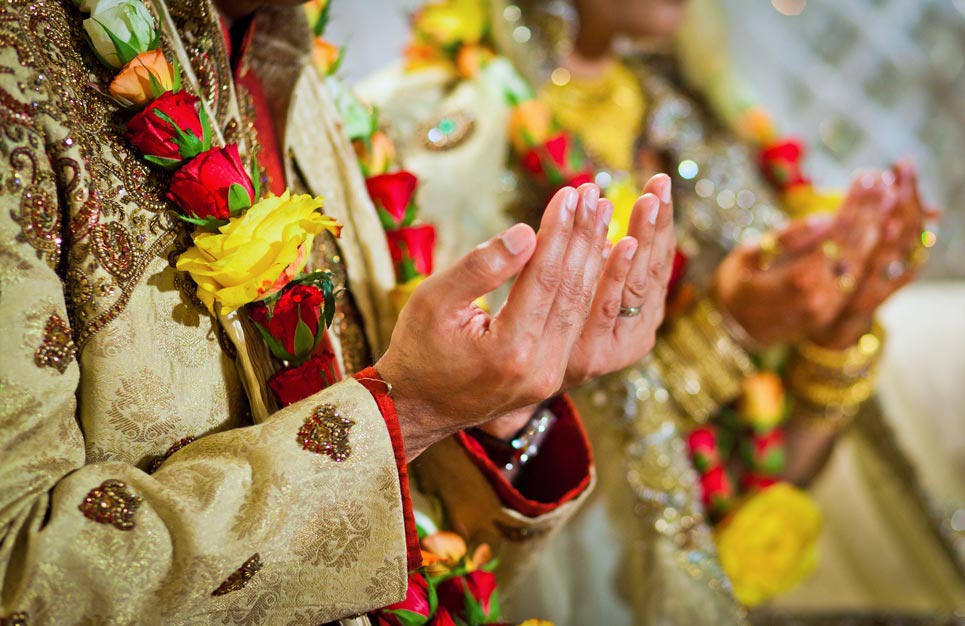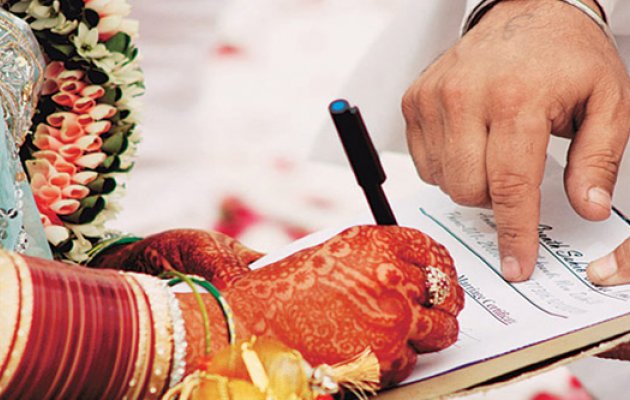Types of Marriage Act
1. Christian Marriage Act
The Indian Christian Marriage Act, 1872, relates to solemnization of marriage of persons professing Christian religion. The Act provides that any marriage solemnized otherwise than in accordance with the Act shall be void.
Solemnization of Christian Marriage
Under Section 5 of the Act Christian marriages can be solemnized by -
- A person who has received Episcopal ordination,
- Any clergyman of the Church of Scotland,
- Any Minister of Religion licensed under the Act,
- A Marriage Registrar appointed under section 7 of the Act and
- Any person licensed under section 9 to grant certificates of marriage.

2. Hindu Marriage Act

The Hindu Marriage Act, which came into power on18 May 1955, governs all the Hindu marriages. The Act has reformed the Hindu law of marriage and covers entire India except the state of Jammu & Kashmir.
The Act applies to:
- Any person who is Hindu, Buddhist, Jain or Sikh by religion.
- Any person who is born to Hindu parents.
- Any person who is not a Muslim Christian, Parsi or Jew, and who is not governed by any other law.
Applicability-
Only if both the parties are Hindus can the marriage take place under the Hindu marriage Act.
The Act does not apply to:
- To persons who are Muslims, Christians, Parsis or Jews by religion.
- To members of the scheduled tribes coming within the meaning of clause (25) of Article 366 of the Constitution of India unless the Central Government by notice otherwise directs.
3. Muslim Marriage Act
The Muslim marriage is governed not by the Indian Majority Act, 1875 but by Muslim law itself. According to Muslim Law, Marriage / 'Nikah' is a contract underlying a permanent relationship based on mutual consent.
Essential Features of Muslim Nikah -
- A Muslim marriage requires proposal (Ijab) from one party and acceptance (Qubul) from the other as is required for a contract.
- There can be no marriage without free consent and such consent should not be obtained by means of coercion, fraud or undue influence.
- Just as in case of contract, entered by a guardian, on attaining majority, so can a marriage contract in Muslim Law, be set aside by a minor on attaining the age of puberty.
- The parties to a Muslim marriage may enter into any ante-nuptial or post-nuptial agreement which is enforceable by law provided it is reasonable and not opposed to the policy of Islam. Same is the case with a contract.

- The terms of a marriage contract may also be altered within legal limits to suit individual cases.
- Although discouraged both by the holy Quran and Hadith, yet like any other contract, there is also provision for the breach of marriage contract.
4. Parsi Marriage Act
The Parsi Marriage and Divorce Act, 1936 governs the matrimonial relations of Parsis in India. The Act defines the word 'Parsi' as a Parsi Zoroastrian. A Zoroastrian is a person who professes the Zoroastrian religion. It has a racial significance. Every marriage as well as divorce under this Act is required to be registered in accordance with the procedure prescribed in the Act.
Requisites to Validity of Parsi Marriages
No Parsi marriage shall be valid if:
- The contracting parties are related to each other in any of the degrees of consanguinity or affinity set forth in Schedule I; or
- Such marriage is not solemnized according to the Parsi form of ceremony called "Ashirvad" by a priest in the presence of two Parsi witnesses other than such priest; or
- In the case of any Parsi (whether such Parsi has changed his or her religion or domicile or not) who, if a male, has not completed 21 years of age, and if a female, has not completed 18 years of age. If a party to the marriage is under that age, the consent of the guardian should be obtained.
Parsi Marriage and Divorce (Amendment) Act, 1988
By the Parsi Marriage and Divorce (Amendment) Act, 1988 (5 of 1988), scope of certain provisions of the Parsi Marriage and Divorce Act, 1936 have been enlarged so as to bring them in line with the Hindu Marriage Act, 1955.
5. Special Marriage Act
The Special Marriage Act was enacted to provide a special form of marriage for any person in India and all Indian nationals in foreign countries irrespective of the religion or faith followed by either party to the marriage. The parties may observe any ceremonies for the solemnization of their marriage but certain formalities are prescribed before the marriage officer can register the marriage. For the good of the Indian citizens abroad, the act provides for the appointment of diplomatic and consular officers as marriage officers for solemnizing and registering marriages between citizens of India in a foreign country. The Act is applicable throughout the country except the state of Jammu and Kashmir.

Conditions for the Special Marriage Act are as follows:
The Act states that a marriage between two persons can be legalized, if the following conditions are satisfied at the time of marriage:
- Neither of the two parties has a spouse living at the time of marriage.
- Neither of the two is incapable of giving a valid consent to the marriage due to unsoundness of mind.
- Neither of the party has been suffering from mental disorder of such a kind or to such an extent as to be unfit for marriages and the procreation of children.
- Neither party has been subject to recurrent attacks of epilepsy or insanity.
- At the time of marriage the groom should be of 21 years of age and the bride should be of 18 years of age.
- Both the parties are not within the degrees of prohibited relationship; provided that where a custom governing at least one of the parties permits of a marriage between them, such marriage may be solemnized, notwithstanding that they are within the degrees of prohibited relationship,
- Where the marriage is solemnized in the State of Jammu and Kashmir, both parties are citizens of India domiciled in the territories to which this Act extends.